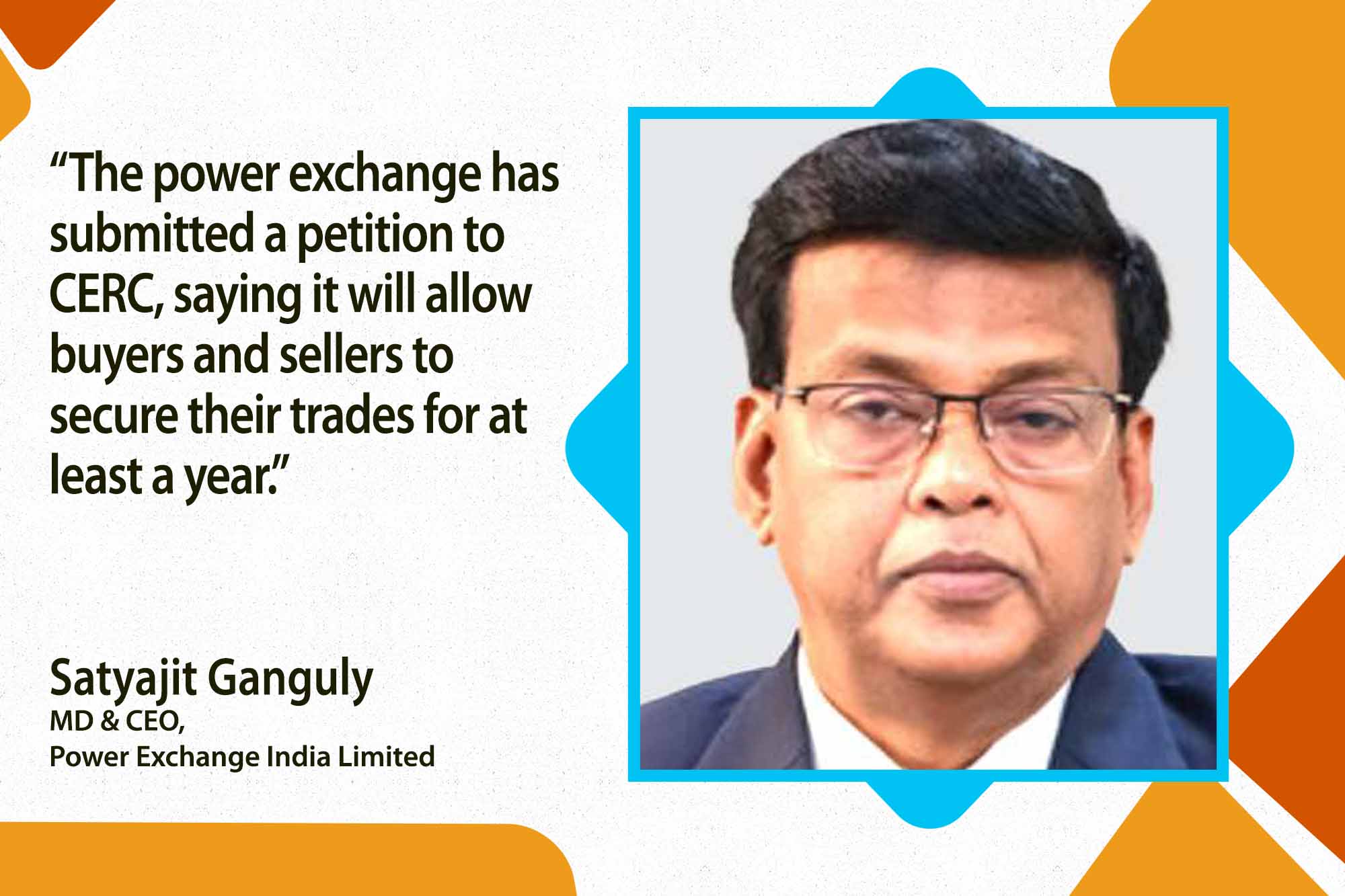PXIL seeks extension of long-duration contracts to 11 months
By EPR Magazine Editorial January 25, 2024 10:33 am IST
By EPR Magazine Editorial January 25, 2024 10:33 am IST

The power exchange has submitted a petition to CERC, saying it will allow buyers and sellers to secure their trades for at least a year.
India is experiencing a surge in energy demand and transition towards renewable sources, leading to substantial growth for power exchange firms. Market coupling and supportive policies have positioned these companies to drive efficiency and play a pivotal role in achieving ambitious renewable energy goals, creating opportunities amid the evolving energy market. Satyajit Ganguly speaks with the EPR Magazine to bring forth the insights of the industry.
How does the rising energy demand affect the power exchange companies, and what are the prospects?
Nearly 59.86 BU of energy has been transacted in H1 of FY 2023-24, an increase of nearly 19.4 percent compared to nearly 50.13 BU of energy transacted in H1 of FY 2022-23. One of the factors contributing to this increase is the introduction of longer tenure contracts for up to 3 months ahead in power exchanges in the later half of FY 22-23. This enabled market participants to meet their power requirements by transacting in conventional, high-price supply, solar, wind, hydro and other types of renewable energy.
PXIL has submitted a petition at CERC seeking approval to increase the tenure of long-duration contracts to up to 11 months ahead to provide a year-ahead power transaction window for market participants. This enhanced duration will allow buyers and sellers to secure their trades for at least a year. Rising energy demand would increase the business volume of Power Exchanges.
How does your company plan to benefit from the rising inflow of investments, particularly in the renewable energy sector?
India has embarked on an ambitious energy transition programme and plans to have 500 GW of non-fossil-based electricity installed capacity by 2030. India stands 4th globally in renewable installed capacity, 4th in wind power capacity, and 5th in solar power capacity (as per International Renewable Energy Agency – Renewable Energy Statistics 2023).
Under the green energy corridor programme, the Ministry of New and Renewable Energy (MNRE) plans to set up a 13,000 MW renewable energy capacity and a 12000 MWh battery energy storage system (BESS) in the Ladakh region.
The power ministry has notified the RPO targets for designated consumers up to March 2030 under the Energy Conservation Act 2001 provisions. The minimum share of renewable energy is set to increase progressively over the year. In FY 2024-25, nearly 29.91 per cent of total energy is targeted to be consumed from renewable sources; this would gradually rise to 43.33 per cent in FY 2029-30. Further, a separate RPO for ‘distributed renewable energy (DRE)’ has been introduced. This new multi-year, long-term trajectory represents a significant step towards a greener, more sustainable energy landscape and will help entities in long-term planning.
The above measures will result in market participants availing contracts of different tenures to meet their power trading requirements.

What are your thoughts on the government’s recent move to integrate several power exchanges?
India adopted the ‘multi-power exchange’ model in 2008 to encourage competition among the exchanges and cater to the growing and varying requirements of market participants. Over the past 15 years, the transacted volume in the power exchanges has increased, resulting in nearly 7 percent of electricity being transacted in the platform.
However, the ‘multi-power exchange’ model has resulted in different prices being discovered in the same market due to varying order books at each power exchange. To overcome this scenario, the Central Electricity Regulatory Commission (CERC) introduced provisions of ‘market coupling’ in CERC (Power Market) Regulations, 2021, enabling uniform price discovery in DAM or RTM or any other contract operating on power exchanges.
Recently, the power ministry advised CERC to take suitable action so that the process of consultation and finalisation of the construct for its implementation is done expeditiously and can be implemented. Later, CERC invited stakeholders to submit their comments and suggestions on the ‘Staff Paper on Market Coupling’. Based on comments and suggestions from stakeholders, CERC would initiate the ‘construct process’ by issuing regulations as prescribed in PMR 2021.
Implementing market coupling would enable market participants to exercise choice for participation in different power exchanges based on value-added services provided by such power exchanges.
How can power exchange companies catalyse India’s approach to achieving renewable energy goals?
We are at a very interesting time right now, with significant policy initiatives being taken to drive forward the power sector in the country. The government is introducing many power sector reforms to bring efficiency, promote de-carbonisation, and ensure a 24×7 reliable and affordable power supply.
To move towards a greener economy, the Carbon Credit Trading Scheme (CCTS) was notified by MOP in June 2022 to involve corporate and private sectors towards energy saving and carbon emission reductions. The CCTS will pave the way for a large-scale promotion of clean energy technologies in India, leading to the de-carbonisation of the Indian economy through active participation by various stakeholders. With the successful operation of REC and ESCert markets by power exchanges over the past 13 years, the exchanges are poised to play a significant role in renewable integration and provide a larger picture for developing carbon markets in the country.
We have a highly supportive policy and regulatory environment today and many opportunities to serve the marketplace through a wide variety of contracts of various tenures and catering to various market segments. Furthermore, the market-based economic dispatch and regulatory provisions like market coupling, once implemented, would further enhance the competitive efficiencies of the power market.
Spokesperson:Satyajit Ganguly, MD & CEO- Power Exchange India Limited.
We use cookies to personalize your experience. By continuing to visit this website you agree to our Terms & Conditions, Privacy Policy and Cookie Policy.